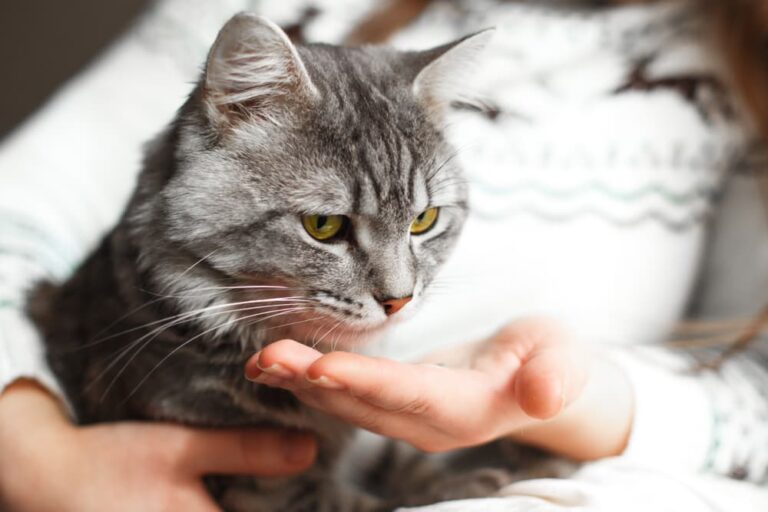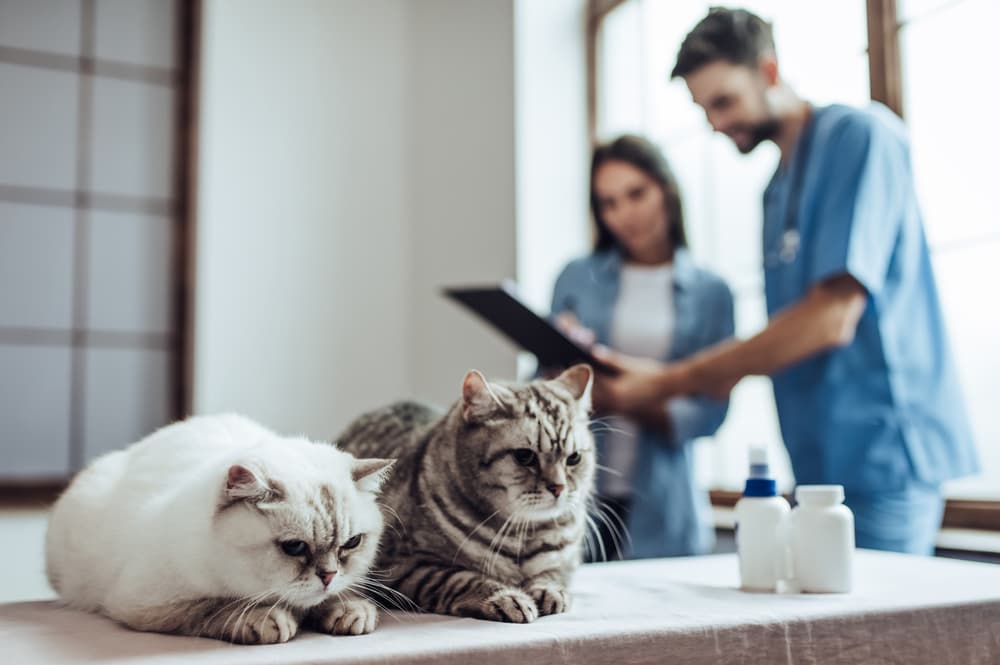Doxycycline for Cats

Medication details
- Medication type: Antibiotic
- Form: Liquid, Capsule, Pill
- Prescription required? Yes
- FDA approved? Not FDA approved for cats or dogs
- Brand names: Adoxa, Alodox, Atridox, Doryx, Doxy, Monodox, Oracea, Oraxyl, Periostat, Vibramycin, Vibravet, Virbra-Tabs, Doxirobe
- Common names: Doxycycline, Doxycycline hyclate, Doxycycline hydrochloride, Doxycycline monohydrate
- Available dosages: Capsules: 10mg, 30mg, 50mg, 60mg, 100mg, 120mg, 300mg, 350mg, 400mg, 525mg, 600mg; Liquid: 2mg/mL, 2.5mmg/mL, 4mg/mL, 4.5mg/mL, 5mg/mL, 5.5mg/mL, 6mg/mL, 6.5mg/mL, 10mg/mL, 20mg/mL, 25mg/mL, 30mg/mL, 34mg/mL, 40mg/mL, 50mg/mL, 60mg/mL, 100mg/mL, 120mg/mL, 150mg/mL
- Expiration range: See bottle label for expiration. Reconstituted liquids are good for only 2 weeks.
Doxycycline is an antibiotic commonly prescribed by veterinarians for cats with a variety of illnesses.
One of doxycylcine’s most frequent uses is for “kitty colds” or upper respiratory infections because it is effective against a broad spectrum of bacteria. Generally doxycycline is well tolerated with minimal side effects in cats.
What is Doxycycline?
Doxycycline is an antibiotic in the class called tetracyclines. These antibiotics are bacteriostatic. That means they prevent bacteria from reproducing but do not kill the bacteria outright. Stopping the bacteria from reproducing, and therefore the infection from worsening, gives the body’s immune system the opportunity to kill the bacteria and cure the infection. Tetracycline antibiotics are effective against a broad spectrum of bacteria types making them very useful in veterinary medicine.
Doxycycline comes in several formulations which are used interchangeably in veterinary medicine. It is readily available from your regular veterinarian or a local pharmacy as it is commonly used in human medicine as well.
Doxycycline is not FDA approved for use in cats in the United States, therefore its use is considered “off-label” or “extra-label.” Many medications commonly used in veterinary medicine fall into this category. This does not mean it is less safe or less effective. Any medication used off-label should be under the close guidance of your veterinarian. .
What Does Doxycycline Look Like?

This section features an affiliate link, meaning GreatPetCare may earn a small commission if you click through and make a purchase.
Doxycycline is a generic medication and therefore the appearance of the capsule, tablet, and liquid varies depending on the laboratory that produced it. If you are concerned you may have the wrong medication, call your veterinarian or the pharmacy that filled the medication to confirm its appearance.
How Does Doxycycline Work?
Doxycycline prevents bacteria from producing proteins necessary for their growth and reproduction. This effect is specific to a type of protein synthesis found in bacteria and therefore is very safe to use, having minimal effects on animal cells.
Doxycycline is time-dependent which means its ability to inhibit bacteria is based on the length of time the bacteria are exposed to adequate doses of the medicine. When taken orally, the medicine is well-absorbed and then excreted in feces.
What Does Doxycycline Treat in Cats?
Doxycycline can be used to treat a wide variety of illnesses in cats. Most commonly it is used as an antibiotic to treat infections of the respiratory tract, mouth, and urinary tract. This includes common kitty colds (upper respiratory tract infections) and periodontal disease.
It is also important in treatment against tick-borne diseases including Lyme disease. Due to its ability to affect the immune system, doxycycline may also be used in conjunction with other medications to treat autoimmune disorders.
Doxycycline can target a special type of bacteria called Wolbachia, which itself resides inside of heartworms. The death of Wolbachia weakens heartworms and can be a valuable part of treatment for cats with heartworm disease. The medication, melarsomine, used to treat heartworms in dogs is not recommended for cats, so weakening the heartworms with doxycycline is even more important in cats.
Below are some cat health problems where doxycycline may be prescribed:
- Upper respiratory tract infections (sinus and nasal infections)
- Urinary tract infections
- Oral infection including periodontal disease
- Abscesses
- Lyme Disease
- Ehrlichiosis
- Tularemia
- Bartonellosis
- Leptospirosis
- Feline Infectious Anemia (Mycoplasma Haemofelis)
- Heartworm Disease
- Lymphocytic/Plasmacytic Pododermatitis
- Lupus
- Anemia
Doxycycline Side Effects in Cats

Doxycycline is usually well-tolerated in cats. The most common side effects are lack of appetite, nausea, and vomiting.
Other side effects include:
- Inappetance
- Lethargy (decreased energy)
- Nausea
- Vomiting
- Hyperthermia
- Esophageal stricture
All tetracycline antibiotics have the potential to cause discoloration of developing teeth but doxycycline is least likely to cause this problem. High doses of doxycycline may inhibit the growth of long bones in cats such as the femur and humerus. If the tablet or capsule gets caught in the esophagus it can cause scarring and result in narrowing of the esophagus known as a stricture.
Always follow any tablet or capsule with at least 5mL water (1 teaspoon). Hypersensitivity reactions are very rare in cats but can result in hyperthermia (high temperature) and malaise.
Reactions With Other Drugs and Medications
Doxycycline should not be given with milk or food high in calcium or iron due to interactions that can reduce the efficacy of the antibiotic. Oral absorption is decreased with antacids and coating agents such as sucralfate. Doxycycline can increase the effect of the cardiac medication digoxin and decrease the efficacy of the epilepsy medication phenobarbital. It should be used with caution with anticoagulants.
Always tell your veterinarian if your cat is taking any other medications before giving your cat doxycycline.
Doxycycline Dosages for Cats

Doxycycline dosage for cats is based on weight, so two cats in the same house may have different dosages. Always follow your veterinarian’s recommendation about dosage amount and frequency.
Because doxycycline is an antibiotic, once you start giving it to your cat you must finish the entire course as prescribed by your veterinarian. Failure to do so can result in antibiotic resistance and a cat who is still sick.
As a rule, cats should be given the liquid formulation of doxycycline whenever possible. If your veterinarian prescribes a tablet or capsule, follow each dose with 5mL (1 teaspoon) of water.
What if My Cat Misses a Dose of Doxycycline?
If you miss a dose, resume giving the medicine the next time it is due. If you miss more than one dose, call your veterinarian. Never give more than one dose of doxycycline to your cat at a time.
Cost of Doxycycline for Cats
The cost of doxycycline varies depending on its availability. There have been times recently when doxycycline was in short supply and therefore difficult to acquire or too expensive to give to veterinary patients.
Generally, doxycycline is widely available and inexpensive. On average, a course of doxycycline should be less than $25-$40 for a typical infection. If long-term use of doxycycline is required, this will increase the cost.
To help offset the cost of medications like Doxycycline, it’s worth considering investing in a pet health insurance policy from a company such as Lemonade. Like people, there’s no telling when your cat might get sick, require medication, or even an emergency vet visit. With policies starting at $10 a month, Lemonade makes pet health insurance very affordable for pet parents.

- Simple sign-up and speedy claims payments.
- Easily file claims using the AI-powered Lemonade mobile app.
- Customize your coverage with add-on preventative plans.
Doxycycline Storage Instructions
Tablets and capsules do not need to be refrigerated but should be stored in a light-resistant container at room temperature. Liquid formulations of doxycycline may need to be refrigerated and are only good for 2 weeks. Compounded formulations may also have special storage instructions. Always follow the recommendation of your veterinarian or pharmacist. Do not use expired antibiotics.
Related Medications
- Minocycline
- Tetracycline









